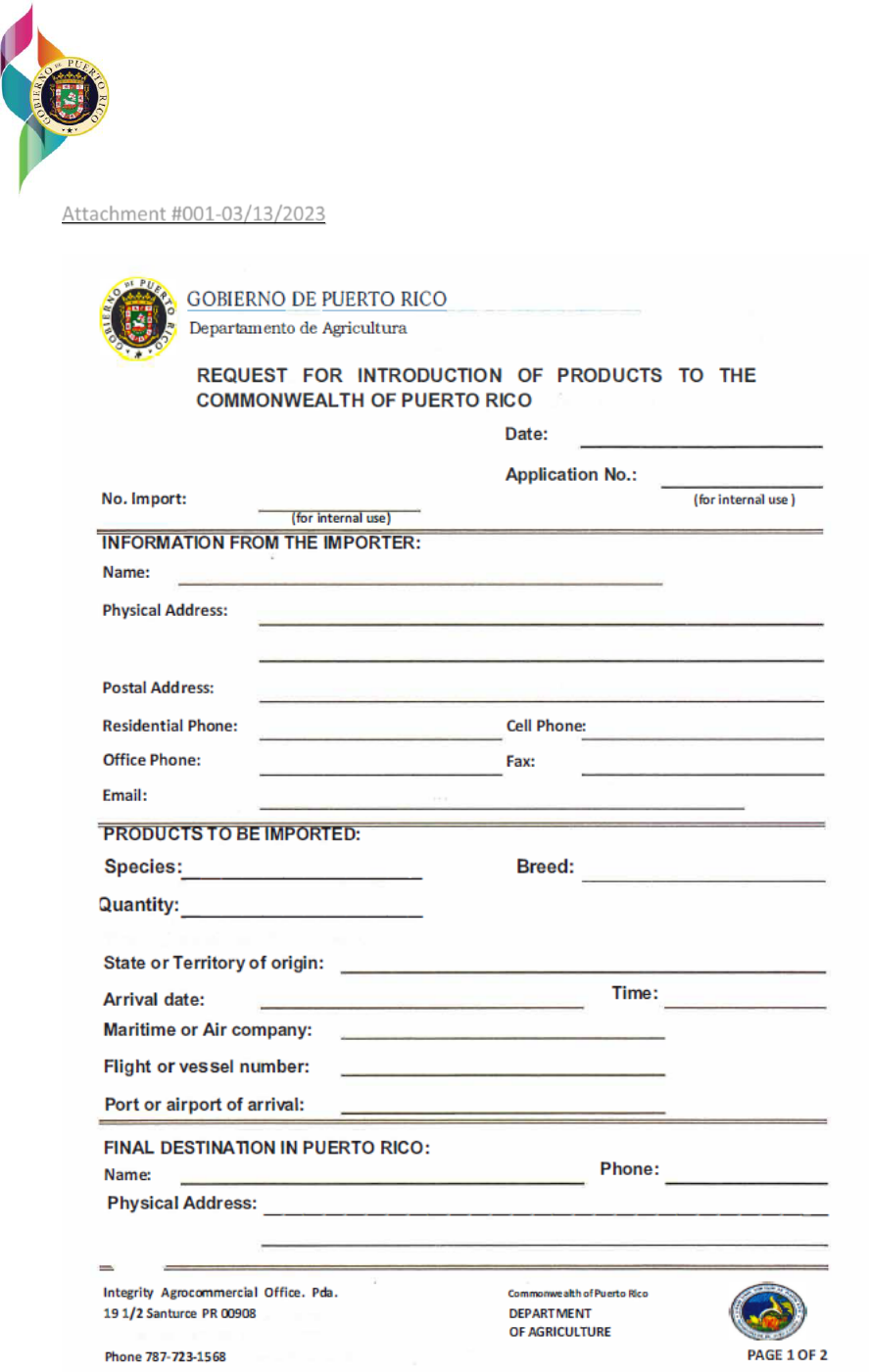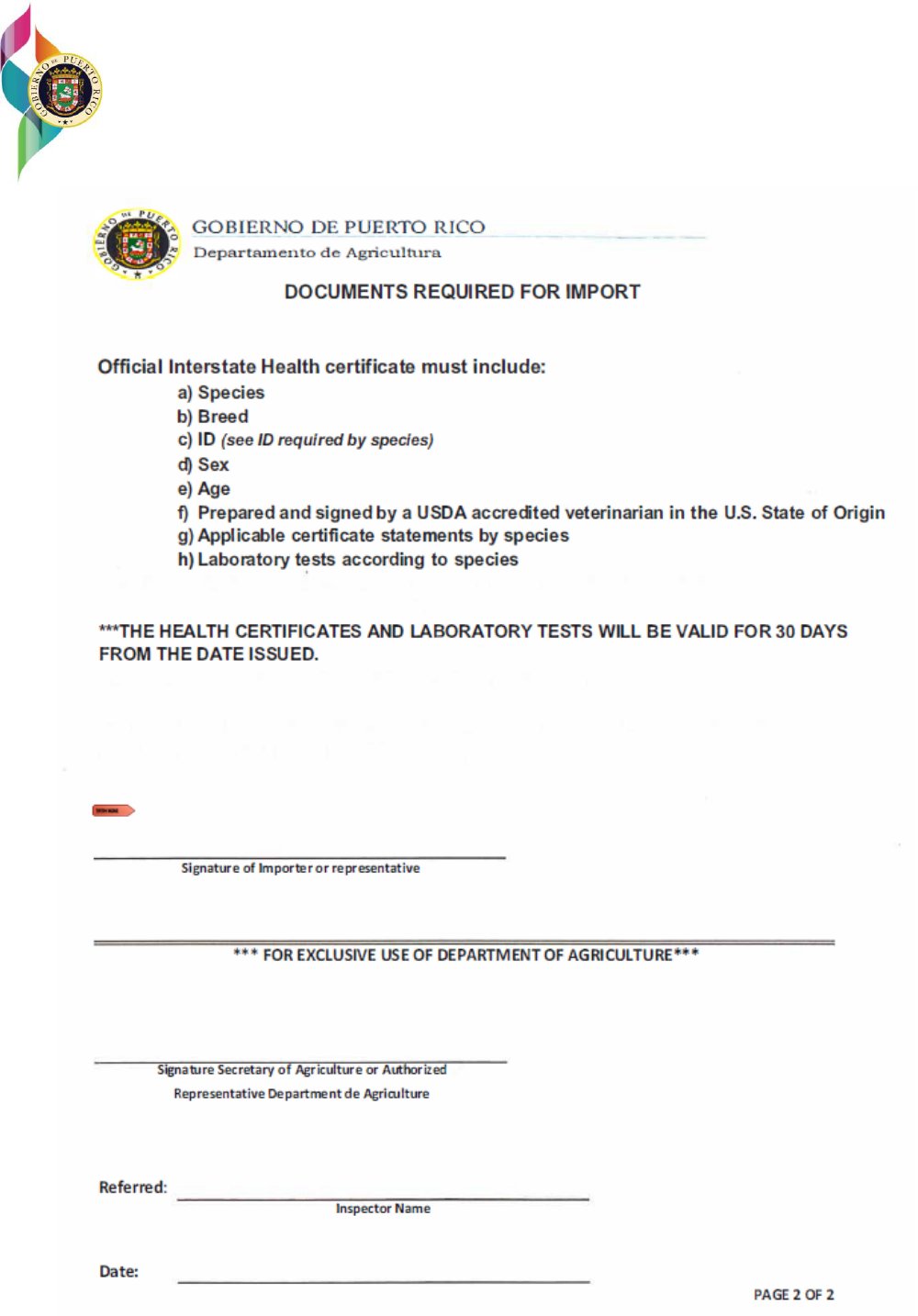
GOVERNMENT OF PUERTO RICO
DEPARTMENT OF AGRICULTURE
State Regulations for Puerto Rico
Last Modified. July 3, 2023
Health Requirements Governing the Admission of Animals into Puerto Rico
For More Information on Current Regulations Please Contact:
Dr. Alejandro Perez
State Animal Health Officer
Puerto Rico Department of Agriculture
Veterinary Services & Animal Health
#9 Road 693, Dorado, PR 00646-3445
Tel. 787-796-0138
Fax: 787-796-5873
Website:
https://www.agricultura.pr
NOTICE.
Due to High Pathogenic Avian Influenza (HPAI) domestic poultry detections in the United
States, the Puerto Rico Department of Agriculture (PRDA) has updated requirements for the
entry of live birds, except those from Pennsylvania, and hatching eggs from all states may be
allowed in only when the importer presents a certification issued by the National Polutry
Improvement Plan (NPIP). These certifications must demonstrate that the products come from
a non-risk area and not currently affected by avian influenza. In both cases, the importer must
request an import permit, which will be evaluated and recommended or denied by the
Department of Agriculture and its Veterinary Laboratory.
Section AO.2023-10A FOR THE PURPOSES OF EASING THE REQUIREMENTS FOR THE
IMPORTATION OF TABLE EGGS AND HATCHING EGGS FROM THE UNITED STATES
Due to detections of Tropical Bont Ticks in St. Croix, USVI, the Puerto Rico Department of Agriculture is
requiring that all livestock (horses, cattle, small ruminants, swine) movements from US Virgin Islands (St.
Croix, St. John & St. Thomas) be accompanied by a certificate of ectoparasite inspection and treatment
with an approved product by USDA and performed by an USDA accredited veterinarian, within 72 hours
prior to shipment.

GOVERNMENT OF PUERTO RICO
DEPARTMENT OF AGRICULTURE
Whenever the laws and regulations concerning the movement and health of livestock, poultry,
birds, and other animals into the territory of Puerto Rico are more restrictive than the laws and
regulations of the Federal Government, the laws and regulations of Puerto Rico shall apply in
addition to those of the Federal Government.
No livestock, poultry, birds or other animals that are affected with or have been exposed to an
infectious, contagious, communicable disease, or ectoparasites or which originated in an area
quarantined by a Territory, State, or the Federal Government because of such disease or
parasites shall be permitted to be introduced into Puerto Rico except with a permit issued by
the SAHO of the Puerto Rico Department of Agriculture.
Each animal or bird that applies for entry to Puerto Rico must be accompanied by an official
certificate of veterinary inspection, signed by an accredited veterinarian in the state or territory
of origin and will be valid for 30 days from the inspection date. An Import Permit is required
prior to shipment of the animals or birds.
All applications for an import permit must be directed to the SAHO, PRDA Veterinary Diagnostic
Lab. #9 Rd. 693, Dorado, PR 00646-3445, and the following information must be included (see
attachment #001-03/13/2023):
1. Name and address of consignor and consignee.
2. Species and number of animals
3. Exact description of the animals or birds including an official individual identification
(microchip for horses and birds), dogs and cats (collar with metallic Id tag or microchip).
Radio Frequency Identification (RFID) tags for livestock (cattle, sheep, goats, other), age,
sex and race.
4. Point of origin
5. The date and results of laboratory or another test.
6. Dates of vaccinations and vaccines administered.
7. Proposed date of shipment.
8. Destination and local address.
9. Means of transportation.
10. Reason for shipment and use of animals.
11. A health certificate stating that the animals are free of symptoms of infectious or
contagious diseases or have been exposed to any diseases.
Contact the PRDA SAHO office for information on Import Permit Requests and charges. See
annex included in this site for additional information.

GOVERNMENT OF PUERTO RICO
DEPARTMENT OF AGRICULTURE
All livestock, poultry, birds, and other animals entering Puerto Rico under permit shall be
consigned to an individual who is a resident of Puerto Rico or to a legal entity authorized by law
to do business within Puerto Rico.
All livestock must be isolated (quarantined) for 15 days immediately after entering Puerto Rico
at the destination facility to allow for further testing by the Puerto Rico Department of
Agriculture.
Any livestock, poultry, birds, or other animals that enter the territory of Puerto Rico which is
found to be affected, a carrier of or been recently exposed to any infectious, contagious, or
communicable disease, shall be returned to its point of origin or destroyed and disposed of as
directed by the office of Veterinary Services & Animal Health of PRDA or an authorized
representative, at the expense of the owner or importer. The Government of Puerto Rico in no
way shall render any compensation for any animals so destroyed.
For animals that originate from outside of the United States or its territories, Federal Import
Regulations are in effect. For more information, please go to www.aphis.usda.gov
***DOGS AND CATS***
• Dogs and cats do not need a PRDA import permit for interstate movement.
• All dogs and cats entering Puerto Rico shall be accompanied by an official health
certificate stating that the animal did not originate from an area quarantined for rabies.
An official certificate veterinary inspection signed by an accredited veterinarian in the
state or territory of origin and will be valid for 30 days from the inspection date. (This is
not a standard form. Each state of origin may use or provide different interstate forms,
CVI, including USDA APHIS form 7001 which can be used for interstate and international
purpose).
• All dogs and cats over four (4) months of age must be vaccinated against rabies within
six (6) months prior to the date of shipment, shall be properly identified and
accompanied by a certificate of vaccination against rabies.
• Treatment for external parasites within 72 hrs. prior to entry and so stated on the
health certificate by the accredited veterinarian.
• An official individual identification (microchip or a collar with metallic ID Tag).

GOVERNMENT OF PUERTO RICO
DEPARTMENT OF AGRICULTURE
***PSITTACINE BIRDS***
(Permit fee: $50)
• All psittacine birds must have a prior import permit, issued by the SAHO of PRDA, upon
entry into Puerto Rico.
• The birds must also be accompanied by an official health certificate stating that the
birds are free of Psittacosis, Avian Influenza, New Castle Disease, and did not originate
from a quarantined area for any infectious or contagious diseases of the species.
REQUIRED TESTS
The birds must be subjected to individual tests with negative results prior to shipment for:
o Avian Influenza (AGID) (HI) or (PCR) test
o Salmonella pullorum, S.gallinarum and S. typhimurium: (rapid plate test,
agglutination test, or identification of agent).
o Chlamydia psittaci: (complement fixation or ELISA).
Exotic bird species must meet any requirements stipulated by the Puerto Rico Department of
Natural Resources (DRNA). For more information, contact DRNA at 787-999-2200 ext. 2750 or
fax 787-999-2268.
***POULTRY & HATCHING EGGS***
(Permit fee: $50)
See Notice, related to regulations for request an Import Permit Number.
Poultry is defined as chickens, turkeys, ducks, geese, guinea fowl, pea fowl, pigeons, doves,
quail, partridges, and pheasants.
• Shipping hatching eggs, newly hatched chicks, and poultry less than five (5) months of
age must be accompanied by a certificate issued by the National Poultry Improvement
Plan (NPIP), indicating that the birds come from flocks classified as “U.S. Pullorum-
Typhoid Clean, U.S. Mycoplasma Gallisepticum Clean, Avian Influenza Clean and
Newcastle Disease Clean” (See attachment #002-03/13/2023)
***HORSES***
(Permit fee: $10 per animal)
• All Equidae 6 months of age or older entering Puerto Rico must be vaccinated against
Equine Encephalomyelitis (eastern and western) vaccine, Influenza and Herpes virus
vaccine within six (6) months prior to the date of shipment.
• All Equidae must have passed a negative Equine Infectious Anemia (EIA) Virus Antibody
test (AGID), -Coggins test-within six (6) months prior to the arrival to Puerto Rico.

GOVERNMENT OF PUERTO RICO
DEPARTMENT OF AGRICULTURE
o The EIA-AGID test must be performed by a USDA approved laboratory, with samples
being collected by an accredited veterinarian or State or Federal regulatory
personnel.
o The results of the AGID -Coggins test- shall be indicated on the official health
certificate, stating the name and address of the laboratory performing the test, the
date, and the results of the test.
***SWINE***
(Permit fee: $50)
The entry of live swine to Puerto Rico is prohibited until further notice. For special import
permit requests contact the PRDA SAHO office. (See attachment # 003-03/13/2023 for special
regulations)
***SMALL RUMINANTS***
(Permit fee: $5 per animal)
The small ruminants are defined as sheep and goats. All sheep and goats entering Puerto Rico
shall be accompanied by an official health certificate stating:
o That they originated in a State or territory officially declared free of Scrapie.
o That they are from herds that are not quarantined for any contagious or
communicable disease.
o That they are not the progeny of scrapie infected animals.
o That they were found negative to a test for tuberculosis and brucellosis within 30
days prior to date of shipment.
o The health certificate must also contain negative tests for goats of Caprine
Arthritis Encephalitis (CAE) and for sheep of Ovine Progressive Pneumonia
(Maedi-visna).
o Treatment for external parasites within 72 hrs. prior to entry and so stated on
the health certificate by the accredited veterinarian.
***CATTLE***
(Permit fee: $10 per animal)
• All cattle, dairy or beef, entering Puerto Rico must be permanently identified by an US
official Radio Frequency Identification (RFID) ear tag. Treatment for external parasites
within 72 hrs. prior to entry and so stated on the health certificate by the accredited
veterinarian.

GOVERNMENT OF PUERTO RICO
DEPARTMENT OF AGRICULTURE
Brucellosis
• All dairy or beef cattle entering Puerto Rico must be completely negative to a serum
agglutination tube test or card test or equivalent test for brucellosis within 30 days prior
to the date of shipment.
• Cattle must originate from certified brucellosis free herds. Exception can be allowed if
they are calves less than 6 months of age, or animals officially brucellosis vaccinated
dairy heifers under 20 months and beef heifers under 24 months of age.
Animals that origin from areas that are classified as modified free certified brucellosis status
need to have a negative lab test within twelve months prior to the date of shipment without
showing reactors. All dairy or beef cattle more than thirteen (13) months of age must have a
negative brucellosis test within thirty (30) days prior to the date of shipment. A certificate of
freedom of ecto parasites and treatment within 72 hours with approved USDA acaracide must
be included.
Tuberculosis
• All cattle upon entering Puerto Rico must have been found to be negative to a
tuberculosis test within 30 days prior to the date of entry. Also, they must have
originated from a tuberculosis free accredited herd or State or Territory or a modified
accredited area from a herd tested negative within twelve (12) months.
• The date and results of the tuberculin test must be recorded on the health certificate.
• All cattle arriving to Puerto Rico will be quarantine at the destination of the consignee
until it has completed a brucellosis test within thirty (30) days of arrival and a second
Tuberculosis test within ninety (90) days of their arrival.
***RABBITS***
(Permit fee: $50)
• All rabbits that apply for entry to Puerto Rico must be accompanied by an official health
certificate signed by an accredited veterinarian in the state or territory of origin and will
be valid for 30 days from the inspection date.
• Special requirements are that all animals need to come from premises which are Rabbit
Hemorrhagic Disease Virus 2 (RHDV2) Free.
• An Import Permit is required prior to shipment of the animals.

GOVERNMENT OF PUERTO RICO
DEPARTMENT OF AGRICULTURE
***ZOO, FUR-BEARING, & OTHER WILD ANIMALS***
(Permit fee: $50)
Exotic species (Zoo, Fur-Bearing and other Wild Animals) must meet any requirements
stipulated by the Puerto Rico Department of Natural Resources (DRNA). For more information,
contact DRNA at 787-999-2200 ext. 2750 or fax 787-999-2268.
An Import Permit is required prior to shipment.
***SEMEN & FROZEN EMBRYOS***
(Permit fee: $50)
Contact the PRDA SAHO for requirements and import permit instructions.
An Import Permit is required prior to shipment.
***BIOLOGICS, MICROORGANISMS, & PARASITES***
(Permit fee: $50)
No microorganism or parasite specimens or samples shall be permitted entry into Puerto Rico
without the written approval of the PRDA SAHO.
An Import Permit is required prior to shipment.
Contact email address:
*Payment (check or money order) send to:
Area Servicios Veterinarios
#9 Rd 693
Dorado, PR 00646-3445

GOVERNMENT OF PUERTO RICO
DEPARTMENT OF AGRICULTURE
Attachment #001-03/13/2023

GOVERNMENT OF PUERTO RICO
DEPARTMENT OF AGRICULTURE

GOVERNMENT OF PUERTO RICO
DEPARTMENT OF AGRICULTURE
Attachment #002-03/13/2023
GOVERNMENT OF PUERTO RICO
AGRICULTURE DEPARTMENT
SAN JUAN PUERTO RICO
ADMINISTRATIVE ORDER 2023-10A
TO AMEND ADMINISTRATIVE ORDER 2023-10 FOR THE PURPOSES OF EASING THE
REQUIREMENTS FOR THE IMPORTATION OF TABLE EGGS AND HATCHING EGGS
FROM THE UNITED STATES
WHEREAS: The Department of Agriculture was established by Article IV, Section 6
of the Constitution of the Commonwealth and is governed by
Reorganization Plan No. 4 of July 29, 2010, known as the
"Reorganization Plan of the Department of Agriculture of 2010”.
WHEREAS: One of the main tasks of the Department of Agriculture is to monitor
and procure the quality and healthiness of the products that are
produced on our island and those that are imported.
WHEREAS: On March 9, 2023, the Department of Agriculture issued
ADMINISTRATIVE ORDER 2023-10 TO TEMPORARILY PROHIBIT THE
IMPORTATION OF BIRDS, TABLE EGGS AND HATCHING EGGS FROM
THE UNITED STATES TO PREVENT THE ENTRY OF AVIAN FLU TO OUR
JURISDICTION.
WHEREAS: This Order obeyed the measures that state and federal authorities
began to take to deal with one of the largest outbreaks of avian flu
(Highly Pathogenic Avian Influenza) in its history, which has affected
more than 58 million farm birds in 47 regions of the country.
WHEREAS: As of today, the reports of incidence of cases of the disease have
reflected a decrease, and although we should not completely eliminate
the precautionary measures that have been taken, we do want to make
some measures more flexible for certain products that show a lower
risk of contagion. This is how we promote the continuous supply of
products for our population.

GOVERNMENT OF PUERTO RICO
DEPARTMENT OF AGRICULTURE
WHEREAS: Through this amendment we will be leaving without effect the
requirement to obtain a certification issued by the United States
Department of Agriculture (USDA) and an import permit for table eggs.
For live birds, except those from Pennsylvania, and for hatching eggs,
the certification issued by the USDA will be replaced by a certification
from the National Poultry Improvement Plan (NPIP) in which it is
certified that the farm of origin is free of diseases.
THEREFORE: I, Ramón González Beiró, Secretary of the Department of Agriculture of
the Government of Puerto Rico, in compliance with my duties and
responsibilities, as well as by virtue of the power conferred on me by
our enabling laws, hereby:
ONE: The SECOND and THIRD subparagraphs of Administrative Order 2023-
10 are amended to read as follows:
SECOND: The entry of live birds, except those from Pennsylvania, and
hatching eggs from all states may be allowed in only when the
importer presents a certification issued by the NPIP. These
certifications must demonstrate that the products come from a
non-risk area and not currently affected by avian influenza. In
both cases, the importer must request an import permit, which will
be evaluated and recommended or denied by the Department of
Agriculture and its Veterinary Laboratory.
THIRD: Every live bird, hatching egg, as well as every lot of any of the
prohibited products, that arrives in Puerto Rico without the proper
certifications and the permission of the Department of Agriculture,
will be destroyed, at the expense of the importer.
TWO: The provisions of this amendment shall be effective immediately upon
its signature and until such time as they are repealed or amended.
AND FOR THE RECORD, I sign and affix the seal of the Department of Agriculture of the
Government of Puerto Rico.
In San Juan, Puerto Rico, today ______ of _________________2023.
____________________________________
RAMÓN GONZÁLEZ BEIRÓ
SECRETARY

GOVERNMENT OF PUERTO RICO
DEPARTMENT OF AGRICULTURE
Attachment #003-03/13/2023
Requirements for Swine to enter the Commonwealth of Puerto Rico – 2018
1. A Permit is required in advance of shipment to import swine into Puerto Rico. The permit can be
obtained from the Department of Agriculture/Veterinary Services Animal Health Division at (787) 796-
1680. Please have the veterinarian who will be issuing the health certificate contact this office at least
one week in advance of shipment for the permit. To process the permit, the veterinarian will need to
submit for review the results of the animal’s negative fecal for the Swine Enteric Coronavirus disease
(SECD). In addition, the official ID for your animal (s) must be written on the lab results and the health
certificate (CVI).
2. The original interstate Certificate of Veterinary Inspection (CVI) must accompany the
shipment. Xerox copies and FAX copies are NOT accepted.
3. The swine must be inspected and the CVI issued within 7 days before shipment, and the issue date
is recorded on the CVI.
4. Swine entering the state must be identified to meet USDA requirements for interstate
movement. (https://www.aphis.usda.gov/traceability/downloads/rule_movement_swine.pdf. Swine for
immediate slaughter must have an individual ear tag, slap brand, or tattoo with this identification
recorded on the CVI. Breeding, feeder, or pet swine must have identification which meets the USDA
requirements for interstate transport, with this identification recorded on the CVI. Companion potbellied
and mini pigs can be alternatively identified with unique microchips that are ISO 11784/85 compliant.
5. Swine Enteric Coronavirus disease (SECD) includes Porcine Epidemic Diarrhea virus (PEDv) and
Porcine Delta Coronavirus (PDCoV). All breeding/pet swine entering the State shall have fecal samples
tested negative for SECD by PCR, as required by the Puerto Rico State Veterinarian or SAHO within 14 days
of entry. All lots of feeder and market hogs entering the State shall be tested negative for SECD diseases
by PCR, as required by the Puerto Rico State Veterinarian or within 14 days of entry. Contact the Hawaii
State Veterinarian to determine the number of hogs to be tested – (787)796-1650
6. All classes of swine except swine for direct slaughter shall have a negative official pseudorabies
serologic test and shall be tested negative for swine brucellosis by a USDA approved laboratory within 30
days before shipment.

GOVERNMENT OF PUERTO RICO
DEPARTMENT OF AGRICULTURE
7. The following statements are written on the CVI:
• Free from external parasites and symptoms of transmissible diseases and have not had recent
exposure to these diseases.
• Have originated in a herd in which there have been no cases of pseudorabies during the twelve-
month period preceding shipment.
• Have not been fed raw garbage.
• Are progeny of and originate in a herd and area not under quarantine for any other swine disease.
